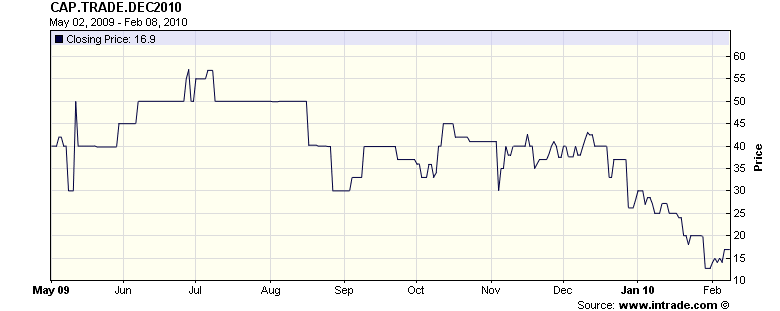 One of the most frustrating things about covering national energy politics is that conventional wisdom in D.C. never seems to change. The incestuous circle of journalists, pundits, lobbyists, and lawmakers known as The Village has its own set of narratives about climate/energy policy. Those narratives are a) completely at odds with the rest of the world’s and b) absolutely impenetrable. For years I’ve wondered if events might finally shift those narratives, but they have incredible tensile strength. They occasionally bend, but they always pop back. Like George Lakoff always says: when the facts don’t fit the frame, it’s the facts, not the frame, that are discarded.
One of the most frustrating things about covering national energy politics is that conventional wisdom in D.C. never seems to change. The incestuous circle of journalists, pundits, lobbyists, and lawmakers known as The Village has its own set of narratives about climate/energy policy. Those narratives are a) completely at odds with the rest of the world’s and b) absolutely impenetrable. For years I’ve wondered if events might finally shift those narratives, but they have incredible tensile strength. They occasionally bend, but they always pop back. Like George Lakoff always says: when the facts don’t fit the frame, it’s the facts, not the frame, that are discarded.
The central narrative is, of course, one of risk and fear. Take this Reuters story from Jan.8. The first sentence: “President Barack Obama’s State of the Union speech to Congress could indicate how badly he wants a global warming bill, which opponents say will cost U.S. jobs and raise prices — a scary prospect for politicians trying to ride out a horrible economy in an election year.” The first sentence isn’t about the problem the bill is meant to solve, or its benefits, or what economists say about it. No, it’s a megaphone for the bill’s opponents, who completely dominate the way the legislation is discussed. If you listen to the whining of conservatives and “centrist” Democrats — or read Politico, which amounts to the same thing — you’d think the clean energy bill was the riskiest vote House Democrats ever took. You’d think focusing on clean energy is perilous in a time of economic trouble. It will raise prices. It will open Dems to defeat in 2010. Republicans will say mean things. Eeeek! Quick, somebody cut some taxes!
Nothing seems to penetrate. Case in point: there were at least four stories last week that should have changed the narrative, but as far as I can tell none of them made a dent.
Massachusetts, like the rest of the country, loves clean energy
Remember when Scott Brown won the Senate race in Massachusetts and it showed that Obama should resign and the Democratic Party should disband? When Republicans vowed to use their new 41-59 majority to block everything ever?
Well, Massachusetts voters think otherwise. They want their new senator to support a clean energy bill:
A poll by Benenson Strategy Group, which did polling for President Obama’s campaign, shows a healthy majority of special election voters favors a “cap-and-trade” bill to limit greenhouse gas emissions. Of those voters who pulled the lever for Brown, half also support cap and trade. And 56 percent of all respondents said they would have a more favorable view of Brown if he voted for a cap-and-trade bill.
This was surprising to the few journalists who covered it, but why should it be? Every poll shows that the clean energy bill in Congress is popular, including polls focused on independent voters and swing states. Seriously, every poll — read Joe Romm’s roundup.
The bill is popular. The bill is popular. The bill is popular. What will it take for that to penetrate?
Climate change is a threat to national security and the military knows it
The Pentagon’s latest Quadrennial Defense Review (QDR) addresses climate change for the first time, noting that “it may act as an accelerant of instability or conflict, placing a burden to respond on civilian institutions and militaries around the world,” and that energy efficiency “can serve as a force multiplier.”
Partly responding to reports like this, veterans advocacy group Vote Vets launched a series of hard-hitting ads last week directed at Congress in general and individual legislators in particular, taking them to task for blocking the clean energy bill:
The Pentagon and Iraq War veterans are not typically considered bleeding-heart greens, but for some reason this man-bites-dog story came and went in the press with barely a whisper. No Republican senator is ever asked why he disagrees with the military brass about climate change. No journalist ever asks Sen. Mary Landrieu (D-La.) why she doesn’t support the troops.
Clean energy creates jobs
Last week yet another study was released showing that clean energy creates jobs. The latest, from Navigant Consulting, shows that a national renewable energy standard of 25 percent by 2025 would create some 274,000 jobs. Meanwhile, a Union of Concerned Scientists study showed that boosting the House clean-energy bill’s RES to 25 percent by 2025 — and coupling it with an energy-efficiency standard of 10 percent — would lower consumer electric and natural-gas prices by an additional $113 billion and reduce compliance costs for emitters by another 4 percent. The price tag for these new jobs and savings? One-tenth of one percent of GDP.
These are just the latest in a long line of studies that have shown that clean energy policy stimulates the economy, creates jobs, and grows new industries, for comparatively little national investment (say, 1/100 what the U.S. spends on its military). Yet still, opponents’ absurd claims receive top billing.
China’s going to drink our milkshake
Last week saw the news that China has now become the world’s largest manufacturer of wind turbines. The country doubled its wind power in 2009. Cleantech investors agree that without supportive government policy, the U.S. will never lead in cleantech. We’re losing the clean energy race, eek!
Now, I actually actually agree with Christina Larson and Brad Plumer: the clean energy “race” metaphor is somewhat goofy. Both countries benefit when both countries move ahead on cleantech; each creates markets and demand for the other, and oh yeah, emissions decline. This is a virtuous circle, not a zero-sum game — there’s no finish line or prize.
Still, you’d think this would be red meat for the American public, which, let’s be honest, has its nationalistic, xenophobic side. But despite stories in The New York Times and The Washington Post, it just doesn’t seem to be gaining much traction (though in fairness it’s catching on more than the three stories above).
WTF?
In a rational world, last week should have been an absolute home run for supporters of the clean energy bill. They should have dominated the news cycle. Polls! Jobs! Veterans! Red scare! I mean, what more do you want?
But all these stories drifted beneath the radar, and as far as I can tell, the basic political calculus around the bill hasn’t changed at all.
What will it take? One answer to that question is: a green progressive media machine that can match the right’s. Though progressive media is incredibly robust compared to a few years ago, it still can’t do for green messaging what the right does for fear mongering: get everyone on the same page to pound home a story. Watch what the right is doing with the IPCC’s woes — every single blog, newspaper, and cable channel is pounding the crap out of it. Next week they’ll have moved onto something else, but when they grab something, they can force it to the top. Progressives, by contrast, are all over the place, each being precious and clever and unique like a snowflake, which is good for their self-image but not so good from a broader communications perspective.
If greens can’t win with the material they’re being given, they might as well give up. It’s an embarrassment of riches! Spend it for chrissake.



